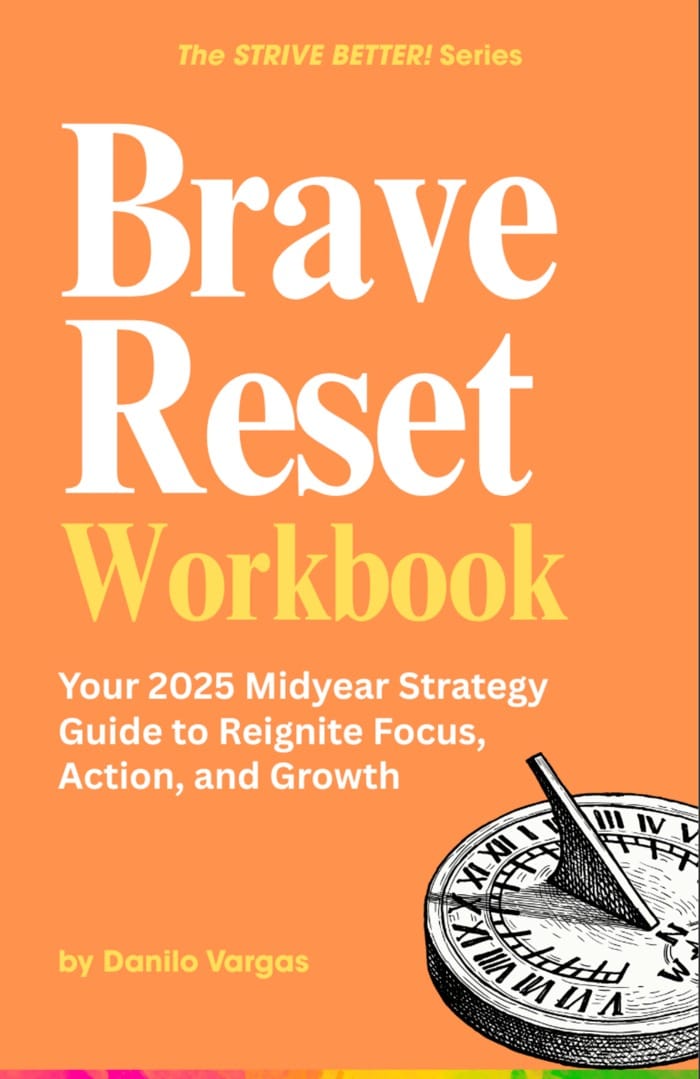Don’t Set Goals Until You’ve Asked Yourself This Pivotal Question
A quick guide to solopreneurial vision, goals, and building the life you want.

What do you want?
It’s such a simple but disconcerting question; so easily overlooked, so loaded with complex existential meaning. It can stop you dead in your tracks, if you let it. But if we ignore the question altogether, or answer half-heartedly, we do so at our peril. As the Cheshire Cat tells Alice, if you don't much care where you're going, then it doesn’t matter which way you go. Or as I've been told once or twice: If you don't define what you want, expect double helpings of what you don't.
It’s a daunting question, not because it’s abstract, but because a real answer demands something audacious of you. It invites you to hope again, to take ownership of your choices, to admit what truly matters and what doesn’t. It forces you to think independently—to name your desires without hedging or hiding behind someone else’s conception of success.
Looking in the mirror in this way triggers a cascade of still harder questions: Where did that want come from? Is it really yours? Who do you think you are to want such a thing (or things)? Do you believe you deserve what you dare envision? Are you willing to make the tradeoffs to make it real? Do you have the enthusiasm, faith, and physical stamina to keep striving for it? And how much striving will be too much?
For me, the question is even dangerously subversive because it calls us to be in tighter alignment with ourselves. In a society ruled by mass market forces, as Carl Jung noted so long ago, this refusal to be a cog in the industrial machine comes with considerable risks to the individual. We risk being “otherized” and cast in the role of the village weirdo or the dangerous stranger. And for many—for people of color, for the vulnerable, for the poor, for immigrants—the question can seem useless; like futile navel-gazing. It is, admittedly, a question that presumes the enjoyment of at least some level of privilege by the petitioner.
For all these reasons and more, the question can seem unapproachable. Best avoided. Like we avoid looking into the sun.
In response, some people employ the strategy of mimicking what others are doing, hoping that borrowed ambition and chicken-heartedness will be enough to get by. Others outsource their direction wholesale, waiting for a boss, a client, or a market trend to dictate their next move. Still others stay busy—deliberately—because as long as they’re reacting, they don’t have to stop and ask whether they’re headed anywhere that matters.
As solopreneurs and creators in the richest nation on Earth, however, and now more than ever, this is a question we must confront head on. As captains of our own ship, it’s sensible to want to avoid drift and to refuse to relinquish our power and agency. So if you’re building something of your own—a business, a body of work, a life with intention—it starts with that very same question: What do you want?
In business, we translate the answer into goals. And not all goals are created equal. There are two kinds that matter—distal and proximal goals—and both have a role to play in your success.
Distal goals are long-range goals. They’re the vision you hold on to when things get messy or hard. The kind of business you want to be running three years from now. The kind of life that your business makes possible. Distal goals aren’t just revenue targets or customer counts—they’re about quality of life, freedom, impact, and fulfillment. Try describing yours in detail—what do you see possible for yourself? Where do you work? What kind of clients do you serve? What does your day look like when things are firing on all cylinders?
But looky, vision alone doesn’t build momentum. That’s where proximal goals come in. These are the near-term actions—concrete, manageable steps that move you closer to that bigger picture. They’re not meant to be grand. They’re meant to be doable: Pitch the offer, reach out to the contact, rework the proposal. Ship the darn thing you’ve been sitting on. Momentum builds from the accumulation of these small, focused moves.
If that sounds obvious, good—it should. No need to overthink it. What matters is whether you’re actually doing it. And whether the small steps you’re taking are in alignment with the bigger thing you say you’re building.
But there’s another layer that often goes unmentioned: how will you know if it’s working? In business, this means keeping score. Not obsessively, but intentionally. Yes, track revenue. Definitely track profit. But also, keep tabs on the less visible mile markers: How sustainable does your pace feel? How often are you doing work that energizes you rather than drains you? Are you working with people who “get” you and are your ardent fans?
I try to remind myself that solopreneurship isn’t just about building a business. It’s about constructing a rhythm of work and life that reflects my deepest values. It’s about being deliberate—especially when everything around me pushes me toward mindless reaction. You don’t need to have everything figured out. But you do need to know what direction you’re headed in, and what step you need to take next. And from time to time, to take stock of where you are and how much further you need to go.
Let your long-term vision be your compass. Let your next action show the world that you’re still on the path.
And above all, don’t forget to ask—again and again—what you want. The answer won’t always be easy. But it will always be uniquely yours.

Brave Reset Workbook
This is NOT just another ebook. It’s your midyear strategic planning tool. It provides you with a focused way to assess your most important strategic decisions and create a better plan for the second half of 2025.
Get the clarity, inspiration, and focus you need to finish with a BIG win this year!




